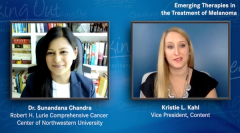
Immune-Modulating Antibodies for Melanoma Treatment
Understanding Immune-Modulating Antibodies
Kristie L. Kahl: Can you discuss where the unmet need is for treating patients whose melanoma has stopped responding to immunotherapy treatment, in particular with anti-PD-1 or anti CTK4/6 inhibitors?
Dr. Sunandana Chandra: When patients start responding to these anti PD-1 or anti-CDK4/6 antibodies, or if they're intolerant of these antibodies, you know, if they have a BRAF mutation, they can be treated with BRAF and MEK inhibitors. But if not, then then a clinical trial is often considered at that time for that patient population, where, you know, they've tried all the FDA approved therapies, trying to kind of figure out what the next best therapy is, is something that we face every day in our practice.
Kristie L. Kahl: Can you explain what PD-1 and PD-L1 are?
Dr. Sunandana Chandra: A healthy immune system can identify and kill tumor cells, including melanoma cells. So, the killing (of the melanoma cells) can happen by different types of immune cells, including cells called T cells. So, PD-1 is known as a checkpoint protein on a T cell. So when PD-1 on that T cell binds its partner or it's ligand, which is present on tumor cells or other immune cells, it acts as a brake. And that binding then actually shuts down that T cell which then ultimately prevents that cancer cell from being killed. So if we can target that PD-1 or PD-L1, it prevents that T cell from shutting down.
Kristie L. Kahl: How do these proteins play a role in treatment options for melanoma right now?
Dr. Sunandana Chandra: What we do is we use drugs that target P-1 or PD-L1. And when you do that, it results in a T cell remaining active. And that can lead to what we call an anti-tumor immune response, which is essentially, the person's own immune system killing the cancer.
Kristie L. Kahl: We're currently looking at combining FDA approved drugs with new agents. Can you explain how these combinations might work in treating melanoma?
Dr. Sunandana Chandra: In general, FDA approved, targeted therapies as well as immunotherapies have been shown to be very effective in treating advanced melanoma. However, what happens is the melanoma tumor can develop what we call resistance mechanisms. So, the tumor has ways to kind of evade the effectiveness of these immunotherapy or targeted therapy drugs. And that can happen due to, you know, mutations in the tumor itself, it can happen due to changes in the environment around the tumor, which is known as the tumor microenvironment, or even changes in the host immune system or the patient's own immune system. And so there are a lot of options out there that are now being actively studied to try to address some of these resistance mechanisms to try to kind of improve upon what we already have.
Kristie L. Kahl: Can you discuss any of these regimens that maybe patients should be keeping an eye on?
Dr. Sunandana Chandra: So some of the therapies that are being actively studied or have shown promise already include what's known as adoptive T-cell therapy, or TIL therapy, which stands for tumor infiltrating lymphocytes. We're also actively studying drugs that target proteins such as LAG3, TIGIT, or drugs that we call immunomodulators, which is kind of a fancy way of saying that we're using these additional drugs to further affect the immune system. And these immunomodulator drugs that are being actively studied are drugs known as toll-like receptor 9 and STING agonists and even less toxic variants of an older drug called IL-2. And basically, all of these drugs are looking at ways of trying to affect our immune system and being able to better kill the cancer.







